必修4-Unit3-动词-ing形式作表语定语和宾语补足语练习(含答案)
- 格式:doc
- 大小:19.00 KB
- 文档页数:3
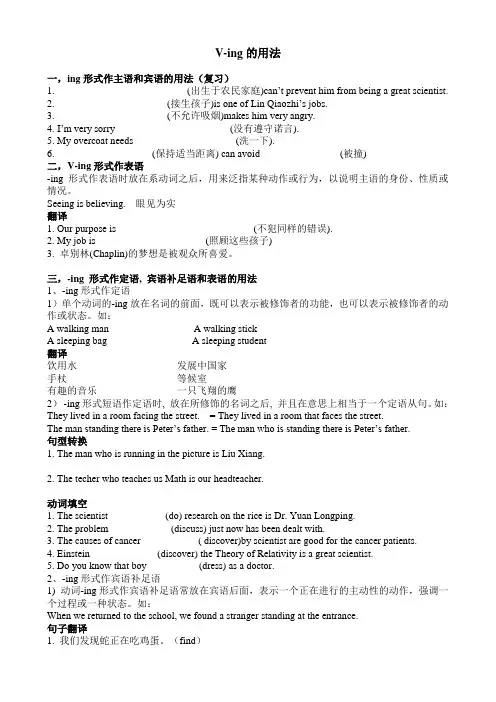
V-ing的用法一,ing形式作主语和宾语的用法(复习)1. __________________________(出生于农民家庭)can’t prevent him from being a great scientist.2. ______________________(接生孩子)is one of Lin Qiaozhi’s jobs.3. ______________________(不允许吸烟)makes him very angry.4. I’m very sorry_______________________(没有遵守诺言).5. My overcoat needs ____________________(洗一下).6. ___________________(保持适当距离) can avoid________________(被撞)二,V-ing形式作表语-ing形式作表语时放在系动词之后,用来泛指某种动作或行为,以说明主语的身份、性质或情况。
Seeing is believing. 眼见为实翻译1. Our purpose is ___________________________(不犯同样的错误).2. My job is______________________(照顾这些孩子)3. 卓别林(Chaplin)的梦想是被观众所喜爱。
三,-ing 形式作定语, 宾语补足语和表语的用法1、-ing形式作定语1)单个动词的-ing放在名词的前面,既可以表示被修饰者的功能,也可以表示被修饰者的动作或状态。
如:A walking man A walking stickA sleeping bag A sleeping student翻译饮用水发展中国家手杖等候室有趣的音乐一只飞翔的鹰2)-ing形式短语作定语时, 放在所修饰的名词之后, 并且在意思上相当于一个定语从句。
如:They lived in a room facing the street. = They lived in a room that faces the street.The man standing there is Peter’s father. = The man who is standing there is Peter’s father.句型转换1. The man who is running in the picture is Liu Xiang.2. The techer who teaches us Math is our headteacher.动词填空1. The scientist ___________(do) research on the rice is Dr. Yuan Longping.2. The problem ____________(discuss) just now has been dealt with.3. The causes of cancer ___________( discover)by scientist are good for the cancer patients.4. Einstein _____________(discover) the Theory of Relativity is a great scientist.5. Do you know that boy __________(dress) as a doctor.2、-ing形式作宾语补足语1) 动词-ing形式作宾语补足语常放在宾语后面,表示一个正在进行的主动性的动作,强调一个过程或一种状态。
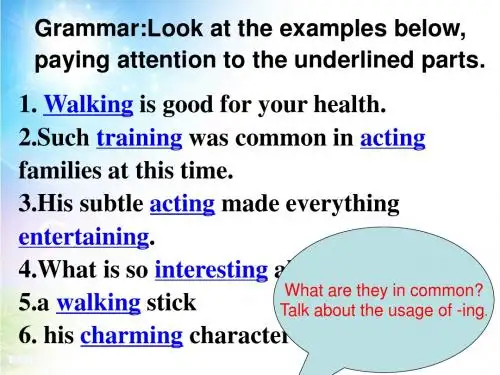
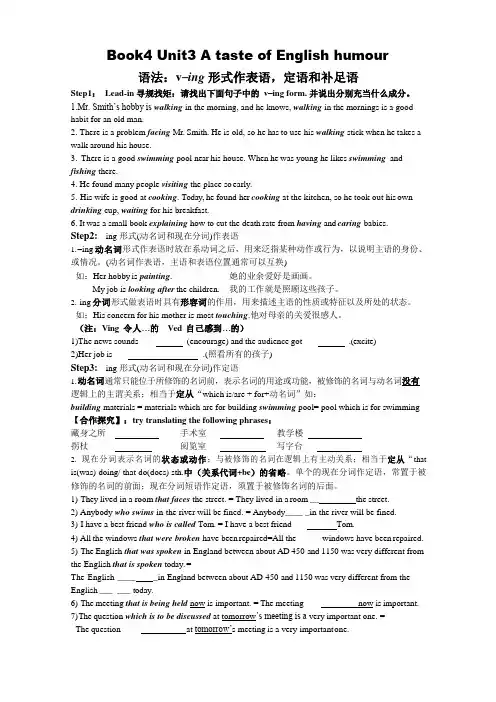
Book4 Unit3 A taste of English humour语法:v–ing 形式作表语,定语和补足语Step1:Lead-in 寻规找矩:请找出下面句子中的v–ing form. 并说出分别充当什么成分。
1.Mr. Smith’s hobby is walking in the morning, and he knows, walking in the mornings is a good habit for an old man.2.There is a problem facing Mr. Smith. He is old, so he has to use his walking stick when he takes a walk around his house.3.There is a good swimming pool near his house. When he was young he likes swimming and fishing there.4.He found many people visiting the place so early.5.His wife is good at cooking. Today, he found her cooking at the kitchen, so he took out his own drinking cup, waiting for his breakfast.6.It was a small book explaining how to cut the death rate from having and caring babies.Step2: ing 形式(动名词和现在分词)作表语1.–ing 动名词形式作表语时放在系动词之后,用来泛指某种动作或行为,以说明主语的身份、或情况。
(动名词作表语,主语和表语位置通常可以互换)如:Her hobby is painting. 她的业余爱好是画画。
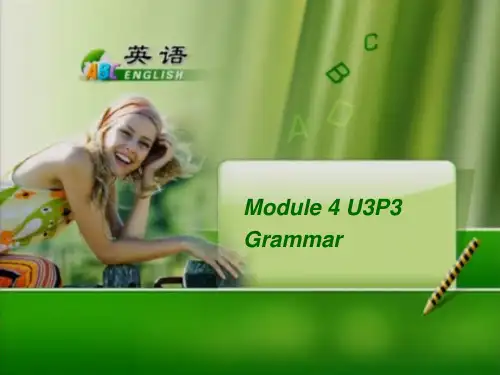
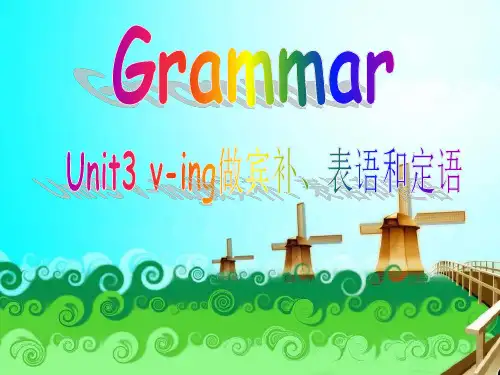
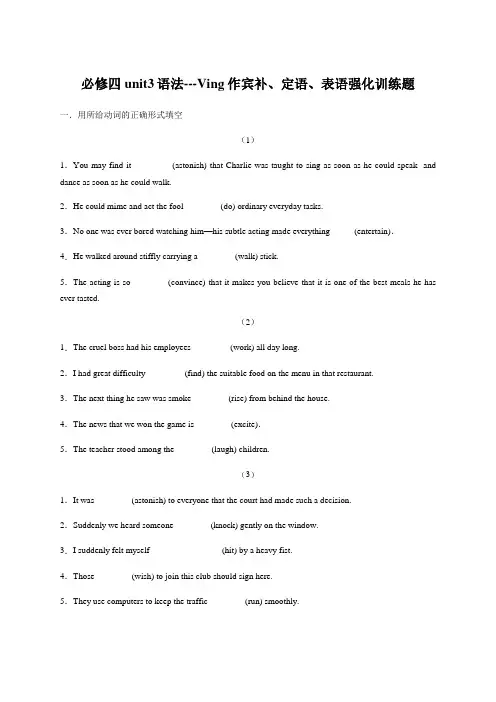
必修四unit3语法---Ving作宾补、定语、表语强化训练题一.用所给动词的正确形式填空(1)1.You may find it ________(astonish) that Charlie was taught to sing as soon as he could speak and dance as soon as he could walk.2.He could mime and act the fool ________(do) ordinary everyday tasks.3.No one was ever bored watching him—his subtle acting made everything _____(entertain).4.He walked around stiffly carrying a ________(walk) stick.5.The acting is so ________(convince) that it makes you believe that it is one of the best meals he has ever tasted.(2)1.The cruel boss had his employees ________(work) all day long.2.I had great difficulty ________(find) the suitable food on the menu in that restaurant.3.The next thing he saw was smoke ________(rise) from behind the house.4.The news that we won the game is ________(excite).5.The teacher stood among the ________(laugh) children.(3)1.It was ________(astonish) to everyone that the court had made such a decision.2.Suddenly we heard someone ________(knock) gently on the window.3.I suddenly felt myself ________________(hit) by a heavy fist.4.Those ________(wish) to join this club should sign here.5.They use computers to keep the traffic ________(run) smoothly.Ⅰ用所给词的适当形式填空1. The villagers saw the fire brightly in the distance. When they hurried there, theyfound some houses to the ground already. (burn)2. I was on my way to my parents' on my motorcycle and saw a middle-aged man (carry) a heavy sack on his shoulders and walking with great struggle.3. Don't reply to any e-mails (request) personal information, no matter how officialor formal they appear.4.I looked up and noticed a snake (wind) its way up the tree to catch its breakfast.5. She told her boy not to stamp on the floor so as not to disturb the (sleep) baby.6. He was very funny and had us (laugh) all the way.7. When we returned to the dormitory, we found a stranger (stand) there.8. The car (run) at high speed is Jim's.9. By the time my friend got there, his son had died on the (operate) table.10. We should hold that seeing is (believe).11. —Is there anything you want from town?—No, thank you. But I would like to get those letters (mail).12. The old couple often take a walk after supper in the park with their pet dog (follow) them.13. We still can't put our minds at ease. There are many problems (remain) to be solved.14. Give me the blue raincoat, please, the one (hang) behind the door.15. When the customer caught the shop owner (cheat) her, she stopped (buy) things there and started dealing with another shop.二.单选1.The lecture,______at 7:00 pm last night,was followed by an observation of the moon with telescopes.A.starting B.being started C.to start D.to be started2.John has finally got the job because he showed me the official letter ________ him it.A.offered B.offering C.to offer D.to be offered3.I looked up and noticed a snake ________ its way up the tree to catch its breakfast.A.to wind B.wind C.winding D.wound4.Listen!Do you hear someone ________for help?A.calling B.call C.to call D.called5.The traffic rule says young children under the age of four and ________ less than 40 pounds must be in a child safety seat.A.being weighed B.to weigh C.weighed D.weighing三.完成句子1.When I caught him ________________(欺骗我),I stopped buying things there and started dealing with another shop.(cheat)2.The kid was so proud of his work that he was just sitting there with ________________(翘着二郎腿)waiting for praise from the teacher.(cross)3.Don't respond to any e-mails________________(询问)personal information,no matter how official they look.(ask)4.With ________________(学生们坐下)in the hall,the visiting professor delivered an impressive speech on the art of language.(seat)5.The lawyer listened with full attention,________________(尽力不失去)any point.(miss)6.When she came back to life,she________________(发现自己躺在)the entrance to a valley.(lie)7.________________(这个消息让人震惊),and there was a frightened look on her face.(shock) 8.The hotel ________________(正在修建的)now was designed by a group of young men.(build) 9.The main job of the young nurse is________________(照看)the old patient.(look) 10.Snow was falling when they went along a path ________________(通向)the mountain.(lead)四.单句改错(每小题仅有1处错误)1.In my opinion,what he said at the meeting was really surprised.2.The waited room is always full of all kinds of people.3.Look!There are some leaves floated on the water.4.When I got there,I saw the famous star surrounding by some girls.5.Her job was checked and answering the emails from all over the world.答案解析一.【1】1.astonishing 2.doing 3.entertaining 4.walking 5.convincing【2】1. working 2. finding 3. rising 4. exciting 5. laughing【3】1.astonishing 2.knocking 3.being hit 4.wishing 5.running1.burning;burned2. carrying3. requesting4.winding5.sleepingughing7.standing8.running 9.operating 10.believing11. mailed get sth done意为“使某事被做”。
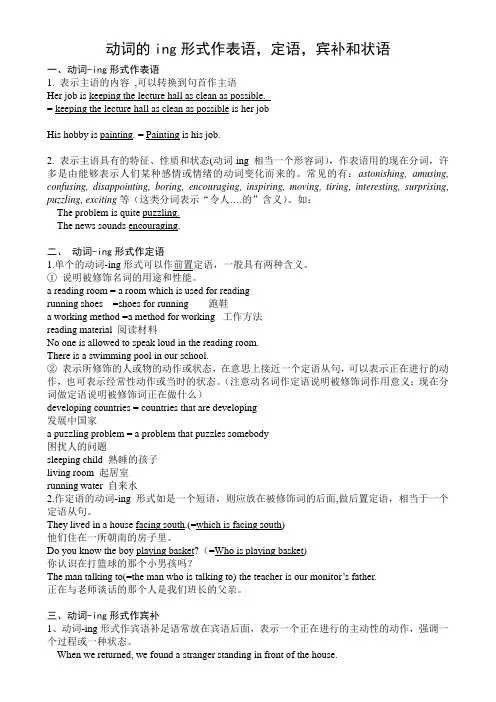
动词的ing形式作表语,定语,宾补和状语一、动词-ing形式作表语1. 表示主语的内容,可以转换到句首作主语Her job is keeping the lecture hall as clean as possible.= keeping the lecture hall as clean as possible is her jobHis hobby is painting. = Painting is his job.2. 表示主语具有的特征、性质和状态(动词ing 相当一个形容词),作表语用的现在分词,许多是由能够表示人们某种感情或情绪的动词变化而来的。
常见的有:astonishing, amusing, confusing, disappointing, boring, encouraging, inspiring, moving, tiring, interesting, surprising, puzzling, exciting等(这类分词表示“令人….的”含义)。
如:The problem is quite puzzling.The news sounds encouraging.二、动词-ing形式作定语1.单个的动词-ing形式可以作前置定语,一般具有两种含义。
①说明被修饰名词的用途和性能。
a reading room = a room which is used for readingrunning shoes =shoes for running 跑鞋a working method =a method for working 工作方法reading material 阅读材料No one is allowed to speak loud in the reading room.There is a swimming pool in our school.②表示所修饰的人或物的动作或状态,在意思上接近一个定语从句,可以表示正在进行的动作,也可表示经常性动作或当时的状态。
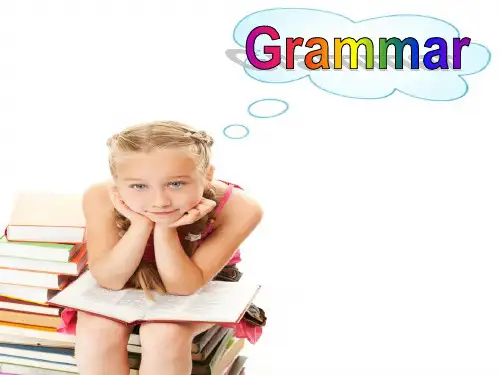
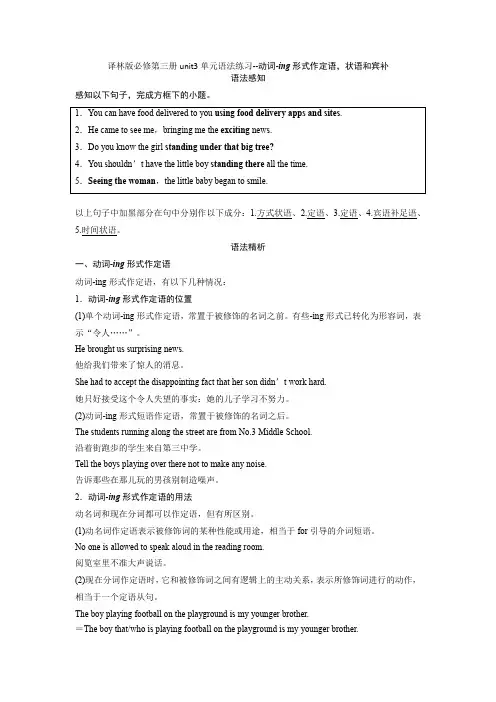
译林版必修第三册unit3单元语法练习--动词ing形式作定语,状语和宾补语法感知感知以下句子,完成方框下的小题。
以上句子中加黑部分在句中分别作以下成分:1.方式状语、2.定语、3.定语、4.宾语补足语、5.时间状语。
语法精析一、动词ing形式作定语动词ing形式作定语,有以下几种情况:1.动词ing形式作定语的位置(1)单个动词ing形式作定语,常置于被修饰的名词之前。
有些ing形式已转化为形容词,表示“令人……”。
He brought us surprising news.他给我们带来了惊人的消息。
She had to accept the disappointing fact that her son didn’t work hard.她只好接受这个令人失望的事实:她的儿子学习不努力。
(2)动词ing形式短语作定语,常置于被修饰的名词之后。
The students running along the street are from No.3 Middle School.沿着街跑步的学生来自第三中学。
Tell the boys playing over there not to make any noise.告诉那些在那儿玩的男孩别制造噪声。
2.动词ing形式作定语的用法动名词和现在分词都可以作定语,但有所区别。
(1)动名词作定语表示被修饰词的某种性能或用途,相当于for引导的介词短语。
No one is allowed to speak aloud in the reading room.阅览室里不准大声说话。
(2)现在分词作定语时,它和被修饰词之间有逻辑上的主动关系,表示所修饰词进行的动作,相当于一个定语从句。
The boy playing football on the playground is my younger brother.=The boy that/who is playing football on the playground is my younger brother.在操场上踢足球的那个男孩是我的弟弟。
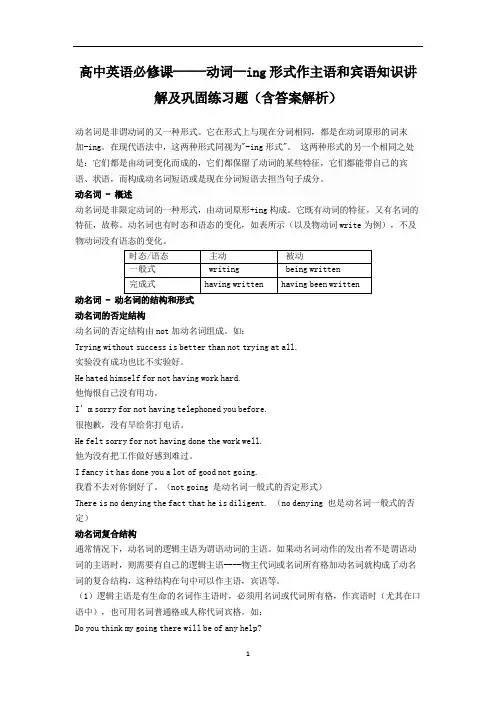
高中英语必修课-----动词--ing形式作主语和宾语知识讲解及巩固练习题(含答案解析)动名词是非谓动词的又一种形式。
它在形式上与现在分词相同,都是在动词原形的词末加-ing。
在现代语法中,这两种形式同视为"-ing形式"。
这两种形式的另一个相同之处是:它们都是由动词变化而成的,它们都保留了动词的某些特征,它们都能带自己的宾语、状语,而构成动名词短语或是现在分词短语去担当句子成分。
动名词-概述动名词是非限定动词的一种形式,由动词原形+ing构成。
它既有动词的特征,又有名词的特征,故称。
动名词也有时态和语态的变化,如表所示(以及物动词write为例),不及物动词没有语态的变化。
动名词-动名词的结构和形式动名词的否定结构动名词的否定结构由not加动名词组成。
如:Trying without success is better than not trying at all.实验没有成功也比不实验好。
He hated himself for not having work hard.他悔恨自己没有用功。
I’m sorry for not having telephoned you before.很抱歉,没有早给你打电话。
He felt sorry for not having done the work well.他为没有把工作做好感到难过。
I fancy it has done you a lot of good not going.我看不去对你倒好了。
(not going是动名词一般式的否定形式)There is no denying the fact that he is diligent.(no denying也是动名词一般式的否定)动名词复合结构通常情况下,动名词的逻辑主语为谓语动词的主语。
如果动名词动作的发出者不是谓语动词的主语时,则需要有自己的逻辑主语----物主代词或名词所有格加动名词就构成了动名词的复合结构,这种结构在句中可以作主语,宾语等。
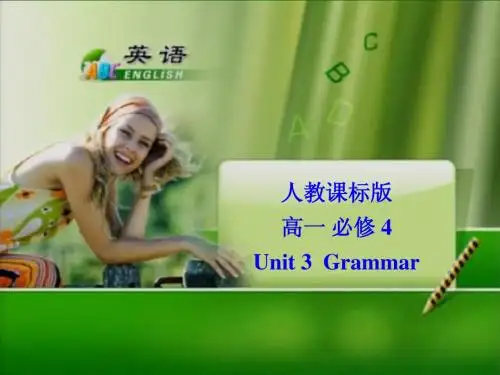
动词ing做宾补表语定语状语及综合练习编辑整理:尊敬的读者朋友们:这里是精品文档编辑中心,本文档内容是由我和我的同事精心编辑整理后发布的,发布之前我们对文中内容进行仔细校对,但是难免会有疏漏的地方,但是任然希望(动词ing做宾补表语定语状语及综合练习)的内容能够给您的工作和学习带来便利。
同时也真诚的希望收到您的建议和反馈,这将是我们进步的源泉,前进的动力。
本文可编辑可修改,如果觉得对您有帮助请收藏以便随时查阅,最后祝您生活愉快业绩进步,以下为动词ing做宾补表语定语状语及综合练习的全部内容。
高中英语语法动词ing形式做宾补表语定语状语用法详解及练习第一部分:动词的-ing形式作宾语补足语1.动词的—ing形式可以在see, hear, notice, watch, feel, smell, look at, listen to, observe, find等表示感官和心理状态的动词后面作宾语补足语,和一个名词或代词一起构成复合宾语。
We heard the children shouting upstairs。
我们听见孩子们在楼上叫喊.I noticed a man running out of the bank when I got off the car。
我下车的时候注意到一个男人从银行里跑出来。
I felt my heart beating violently。
我觉得我的心在猛烈地跳动。
2.动词的—ing形式和不定式作宾语补语的区别在see, hear, feel, watch, notice等感官动词后,既可用动词的-ing形式构成复合宾语,也可用不定式构成复合宾语,两者之间有一定的区别。
用动词的—ing形式时,表示动作正在进行;用不定式时,表示动作发生了,即动作的全过程结束了。
He saw a girl getting on the car。
他看见一个女孩在上汽车。
(She was getting on the car.)He saw a girl get on the car and drive off. 他看见一个女孩上车开走了。
Unit 3 A taste of English humourLearning about Language动词-ing形式作表语、定语和宾语补足语【语法感知】用所给词的适当形式填空,并指出其在句中所充当的成分1.No one was ever bored watching him—his subtle acting made everything entertaining (entertain).(宾语补足语)2.He grew more and more popular as his charming (charm) character, the little tramp, became known throughout the world.(定语)3.He walked around stiffly carrying a walking (walk) stick.(定语)4.The acting is so convincing (convince) that it makes you believe that it is one of the best meals he has ever tasted.(表语)【语法精讲】一、动词-ing形式在句中作表语1.作表语的动词-ing所体现的是名词的特性,用于对主语的内容进行解释说明,可表示抽象或习惯上的动作,且主语和表语可以换位。
*One of his weaknesses is telling lies.= Telling lies is one of his weaknesses.他的缺点之一就是撒谎。
*My job is delivering milk from door to door every morning.我的工作就是每天早上挨家挨户送牛奶。
2.作表语的现在分词是形容词性的,表示主语的性质或特征,这时通常看作是形容词,且主语与表语不可换位。
1 / 3
动词-ing形式作表语、定语和宾语补足语的练习
一、用所给动词的适当形式填空。
1. We heaard them (quarrel) about money after the concert. They looked very angry.
2. The villagers saw the fire (burn) brightly in the distance. When they hurried there,
they found some houses (burn) to the ground already.
3. I didn’t see anyone (take) away your paper. It might have been blown by the
wind.
4. During the days (come) we’ll make good preparations for the sports meeting.
5. The woman (look) at her map is a relative of my mother.
6. Einstein was one of the greatest scientists (repect) by people.
7. Doing nothing is (do) ill.
8. To do that would be (cut) the foot to fit the shoe.
9. We were all very (surprise) at the news. I found it very
(surprise).
10. He gave us an (inspire) speech. We were all (inspire).
二、在空白处填入适当的单词,完成下列句型转换(每空一词)。
1. Your task is cleaning the house carefully.______ ______ _______ _______ is your task.
2. His speech inspired us. We _________ _________ by his speech.
3. The boy who was missing was last seen playing near the lake. The ______ boy was last seen playing
2 / 3
near the lake.
4. We heard that they were quarrelling about money after the concert. We heard ______ ______ about
money after the concert.
5. He made up his mind to buy a machine for washing for his parents. He made up his mind to buy a
______ ______ for his parents.
6. The man who is talking to the teacher is a model worker. The man ______ ______ the teacher
is a model worker.
三、下列句子中各有一处错误,请指出并改正。
1. It’s no use cry over spilt milk.
2. It was so cold that they kept the fire burnt all night.
3. John’s bad habit is read without understanding.
4. The problem discussed now has something to do with pollution
5. It is believed that if a book is interested, it will surely interest the readers.
6. The old man, worked abroad for twenty years, is on the way back to his motherland.
7. Australia is an English-spoken country.
8. He tried to avoid to answer my questions.
9. Tell the children played there not to make such noise.
10. The missing beggar was last seen walk along the road.
11. Having told which way to take, the traveler went on his journey.
12. There are two roads before us, one leads to the beach, the other to the park.
3 / 3
答案:
一、1. quarrelling 2. burning, burned 3. take 4. to come 5. looking 6. respected 7. doing
8. to cut 9. surprised, surprising 10. inspiring, inspired
二、1. Cleaning the house carefully 2. were inspired 3. missing 4. them quarreling 5.
washing machine 6. talking to
三、1. cry改成crying 2. burnt改成burning 3. read改成reading 4. discussed改成being discussed
5. interested改成interesting 6. worked改成having worked 7. English-spoken改为
English-speaking 8. to answer改为answering 9. played改为playing 10. walk改为walking
11. Having told改为Having been told 12. leads 改为leading